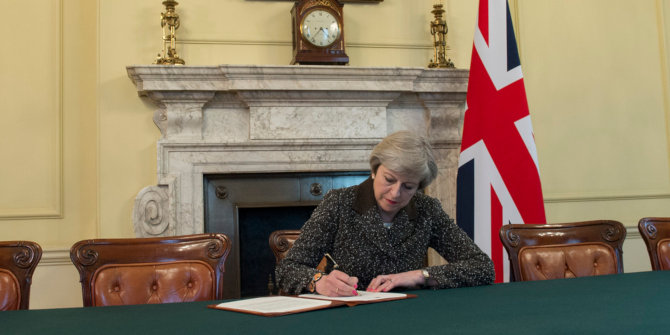The creation of a European social policy has been a long-held goal of many political actors across Europe. Drawing on a new book, Mechthild Roos shows how the early European Parliament was pivotal in establishing this social dimension to European policymaking.
Making Europe mean more to its citizens has been a long-standing endeavour of politicians and bureaucrats at the EU level. One of the strategies applied in pursuit of this target has been to make EU politics more (positively) tangible for the average citizen by improving their living and working conditions, as stipulated in every Community/EU treaty to date, starting with Art. 2 of the Treaty of Paris (1951) and all the way up to the preamble of the Treaty on the Functioning of the EU. Whilst manifold policy measures may result in people’s improved living and working conditions, one of the most intuitive and immediate roads to take in this regard is the area of social policy.
Yet, European social policy remains fragmentary, as competences are firmly held by the member states. In consequence, the EU’s social dimension is little more than a compilation of scattered legislation, non-binding programmes and recommendations, and cooperation rather than regulation. This, in turn, has resulted in EU social policy being considered a mere side product of the creation of a European Single Market.
This perception, however, has been opposed by some actors seeking to make the European project more than an economic union. Among them were, from the Community’s first moments, the members of the early European Parliament (EP) – a group of parliamentarians delegated by the member states’ parliaments to fill a part-time mandate at the European level alongside their national one, with little prospect of either noteworthy political impact or significant career gains coming with the additional workload prior to the EP’s first direct elections in 1979.
Nevertheless, these early MEPs developed a remarkable degree of supranational-level activism, going far beyond the tasks and duties formally provided for their European assignment. What drove these delegates in their activism was first and foremost their broadly shared conviction of the added value of closer European integration – and of the need for stronger involvement from the member states’ citizens through democratically elected representatives, strengthening the democratic legitimacy of the Community project overall.
Social policy in the early European Parliament
From the early MEPs’ point of view, providing the Community with a stronger social dimension served this purpose in a double sense. First, the aim to deepen and extend European integration towards the attainment of a European union could in the delegates’ view only be realised via strong public support for and on people’s identification with the Community project.
The MEPs hoped to reach such support and identification by demonstrating to the people how Community social measures could improve their lives directly, for instance with regard to their housing and employment situation, freedom of movement, health and social security coverage. Through an extended bandwidth of social measures, MEPs sought thus to convince the member states’ citizens of the value of closer integration for them personally, and to counter perceptions of the Community as a top-down, technocratic and purely economic entity.
Second, MEPs sought to establish their institution as the representative of the people in order to increase the EP’s parliamentary character and powers, and to reinforce their argument before the Council and the Commission that the involvement of the EP in Community legislation would provide Community decision-making with more democratic legitimacy.
Based on contacts with their constituents, social partners and interest groups, MEPs strove for a better social regulation of citizens’ living and working conditions in order to strategically position themselves as promoters of the people’s interests. The delegates hoped thus to increase public support for closer European integration whilst simultaneously enhancing their own institution’s position.
Success against the odds
In pursuit of their socio-political endeavour, MEPs faced a dual challenge, namely the EP’s limited parliamentary powers on the one hand – the role provided for the EP by the founding Treaties was little more than that of a consultative assembly – and the few and fragmented Treaty provisions regarding the area of social policy on the other. However, considering these restrictions, the EP’s socio-political activism left remarkable traces in Community legislation and, in the larger picture, in European social integration.
The delegates’ success in exerting influence on Community social policy built on various intertwined factors, notably the parliament’s close inter-institutional relationship with the European Commission as sole holder of the power of initiative. The EP’s socio-political activism was facilitated further by the gradually growing willingness of member state governments to accept the EP’s increasing involvement in legislative procedures, based on the successful positioning of the EP as the sole guarantor of democratic legitimacy for Community policy-making.
Moreover, a range of exogenous developments such as crises, technological and societal developments helped EP activism in the area by generating or exacerbating different societal groups’ social needs across the member states. In light of these circumstances, the EP managed to incrementally push the remits of European social policy.
The parliament successfully managed to shift the focus and scope of a range of socio-political measures to include a broader target group of persons, thus contributing significantly to an extension of European social policy from focusing exclusively on the member states’ working population, to also addressing particularly vulnerable social groups such as children, youth, the elderly, and people with disabilities.
It also extended funding available for the implementation of Community social measures, e.g. via the European Social Fund; convinced the Commission to initiate proposals and recommendations for social action; and exerted pressure (not least via its members’ double role as European and national parliamentarians) on member state governments to better implement Community social legislation.
A proactive player
Whilst it should be noted that such instances of EP influence remained relatively fragmentary and limited – notably when measured against MEPs’ larger ideas of a comprehensive social dimension to the Community – they do point in a direction that later developments in European social policy followed. This concerns both concrete initiatives promoted by the EP, which were adopted and/or implemented years – and sometimes decades – after they had entered the Community political agenda, as well as larger patterns characterising EU social policy today.
An example of the former is the decades-long institutional battle to establish European-level rules on maternity protection, an endeavour the Commission gave up on in 1970 in the face of member state opposition, but for which the EP continuously pressed until its eventual adoption in 1992.
Beyond the above-mentioned repeated extension of European social measures to new, particularly vulnerable groups of people, the EP’s influence on larger patterns in EU social policy(making) can be traced not least in parliamentary attempts to turn socio-political soft-law measures into binding legislation, whilst at the same time continuously resorting to soft law mechanisms in areas for which the Treaties provide no, or only very limited, EU competences in order to further extend the European social dimension. The EP itself has retained its role as a proactive player in and promoter of closer social integration until today.
For more information, see the author’s new book The Parliamentary Roots of European Social Policy: Turning Talk into Power (Palgrave Macmillan, 2021)
Note: This article gives the views of the author, not the position of EUROPP – European Politics and Policy or the London School of Economics. Featured image credit: CC-BY-4.0: © European Union 2019 – Source: EP





